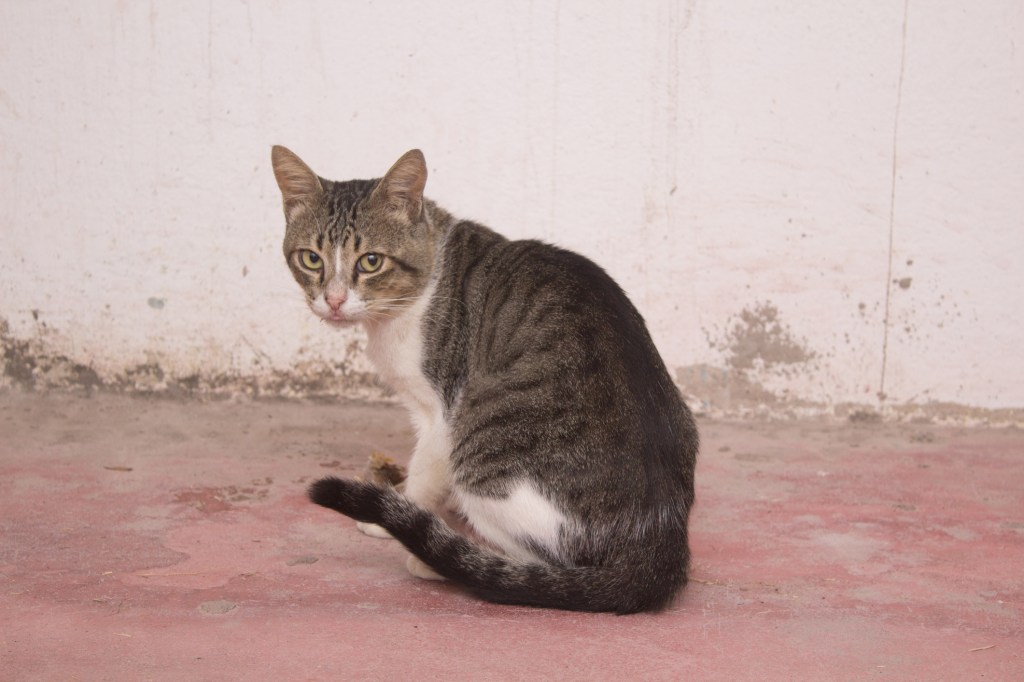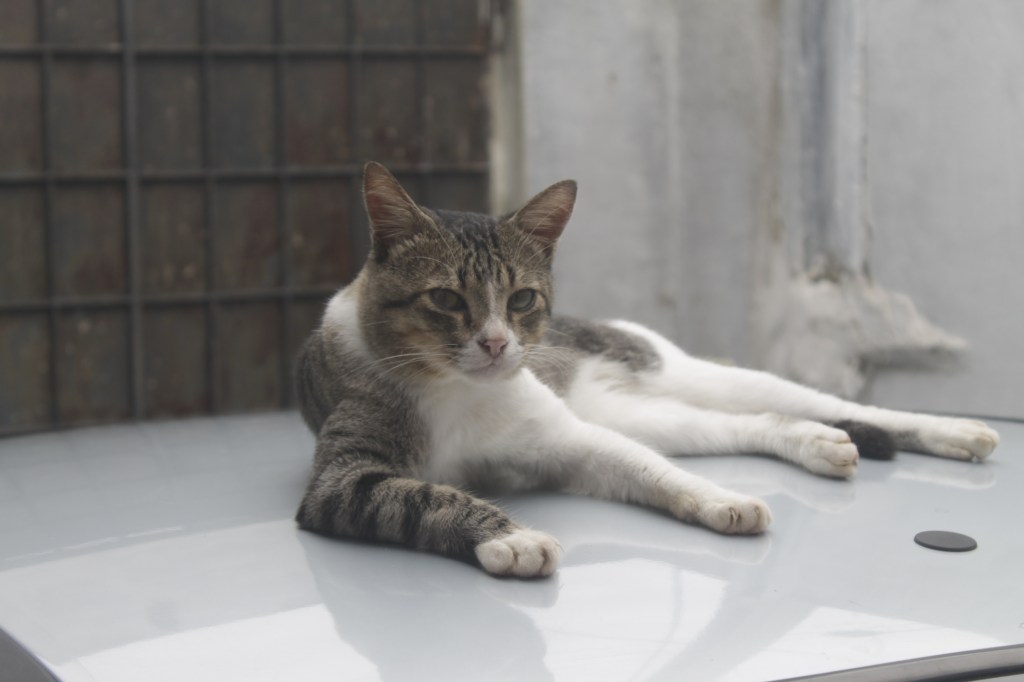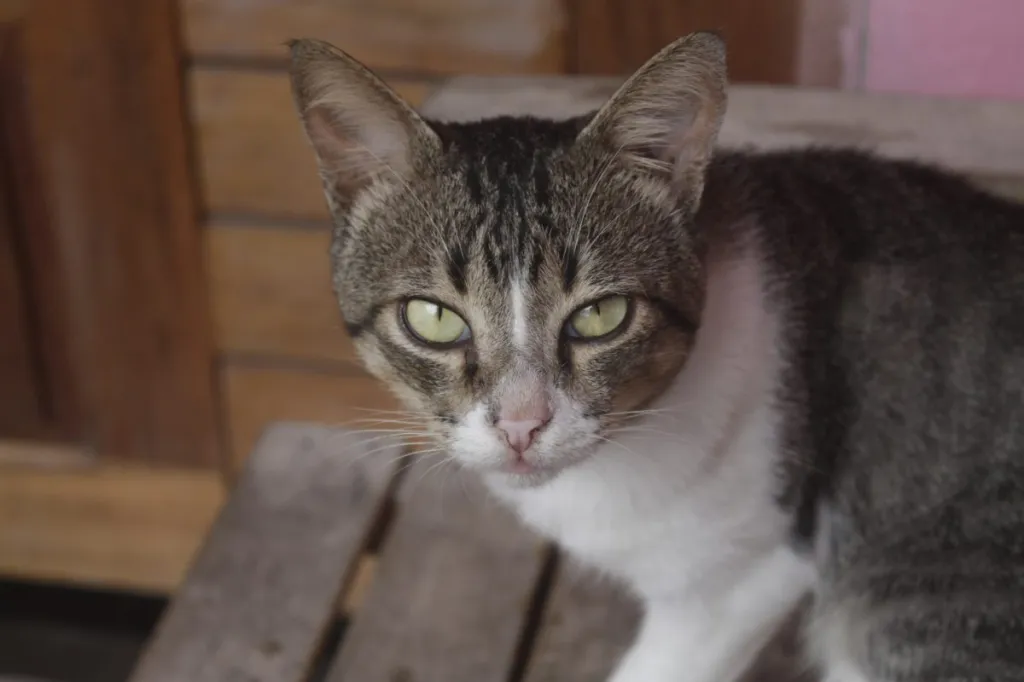The Brazilian Shorthair, also known as the “Brazilian Shorthair Domestic Cat,” gained recognition for their distinct appearance and amiable nature. Originating in Brazil, these cats have a medium-sized, well-proportioned body with a short, sleek coat that can come in a variety of colors and patterns. The Brazilian Shorthair is also known for their friendly and sociable temperament, making them an ideal companion for families and individuals alike. These cats tend to form strong bonds with their human caregivers, often seeking affection and enjoying interactive play. Their adaptable nature allows them to thrive in various living environments, and their low-maintenance grooming needs add to their appeal as an easy-to-care-for pet.
Whether engaging in playful antics or lounging in a sunlit spot, these cats bring joy to households seeking loving and interactive feline companions. The breed’s adaptability, combined with their charming personality and distinctive appearance, has contributed to the Brazilian Shorthair’s popularity both in their native country and beyond.
When considering a Brazilian Shorthair kitten, it’s advisable to prioritize adopting from rescue organizations or shelters to provide a loving home to a cat in need. However, if you decide to purchase, it’s crucial to choose a reputable breeder. Conduct thorough research to ensure that the breeder follows ethical practices and prioritizes the well-being of their cats. Reputable Brazilian Shorthair kitten breeders prioritize the health and temperament of their cats, conduct necessary health screenings, and provide a nurturing environment for the kitties. This active approach ensures that you bring home a healthy and happy kitty while discouraging unethical breeding practices.
Quick Facts
- Origin: Brazil
- Size: Medium (8-12 pounds), males slightly larger than females.
- Breed Group: Landrace (naturally occurring breed)
- Lifespan: 14-20 years
- Coat: Their short coat comes in a wide variety of colors and patterns including solid, bicolor, tabby, tuxedo, calico, tortoiseshell, and pointed.
- Temperament: Confident, inquisitive, playful, friendly, energetic, enjoys human interaction and playtime.
- Exercise Needs: High
- Training: Can be trained with positive reinforcement due to their intelligence and playful nature. They enjoy learning tricks.
- Grooming: Minimal
- Health: Generally healthy with few pre-existing conditions.
- It’s not unusual for Brazilian Shorthair cats to live long lives.
- The Brazilian Shorthair is more slender than the American Shorthair.
- These cats can come in almost any color.
Brazilian Shorthair Pictures


-
Affectionate with Family
Some cat breeds are typically independent and aloof, even if they’ve been raised by the same person since kittenhood; others bond closely to one person and are indifferent to everyone else; and some shower the whole family with affection. Breed isn’t the only factor that goes into affection levels; cats who were raised inside a home with people around feel more comfortable with humans and bond more easily.

See Cats Less Affectionate with Family -
Amount of Shedding
If you’re going to share your home with a cat, you’ll need to deal with some level of cat hair on your clothes and in your house. However, shedding does vary among the breeds. If you’re a neatnik, you’ll need to either pick a low-shedding breed or relax your standards. This furniture cover can make it easier to clean up cat hair and keep it off your sofa!
-
General Health
Due to poor breeding practices, some breeds are prone to certain genetic health problems. This doesn’t mean that every cat of that breed will develop those diseases; it just means that they’re at an increased risk. If you’re looking only for purebred cats or kittens, it’s a good idea to find out which genetic illnesses are common to the breed you’re interested in.
-
Potential for Playfulness
Some cats are perpetual kittens—full of energy and mischief—while others are more serious and sedate. Although a playful kitten sounds endearing, consider how many games of chase the mouse-toy you want to play each day, and whether you have kids or other animals who can stand in as playmates. A classic wand cat toy like this one is perfect for playful felines!
-
Tendency to Vocalize
Some breeds sound off more often than others with meows, yowls, and chattering. When choosing a breed, think about how the cat vocalizes and how often. If constant “conversation” drives you crazy, consider a kitty less likely to chat.
-
Kid-Friendly
Being tolerant of children, sturdy enough to handle the heavy-handed pets and hugs they can dish out, and having a nonchalant attitude toward running, screaming youngsters are all traits that make a kid-friendly cat. Our ratings are generalizations, and they’re not a guarantee of how any breed or individual cat will behave; cats from any breed can be good with children based on their past experiences and personality.
-
Friendly Toward Strangers
Stranger-friendly cats will greet guests with a curious glance or a playful approach; others are shy or indifferent, perhaps even hiding under furniture or skedaddling to another room. However, no matter what the breed, a cat who was exposed to lots of different types, ages, sizes, and shapes of people as a kitten will respond better to strangers as an adult.
-
Easy to Groom
Some breeds require very little in the way of grooming; others require regular brushing to stay clean and healthy. Consider whether you have the time and patience for a cat who needs daily brushing. You should definitely pick up this awesome de-shedding tool for cats of any hair length!
-
Intelligence
Some cat breeds are reputed to be smarter than others. But all cats, if deprived the mental stimulation they need, will make their own busy work. Interactive cat toys are a good way to give a cat a brain workout and keep them out of mischief. This scratcher cat toy can keep your smart kitty busy even when you’re not home!
-
Pet Friendly
Friendliness toward other household animals and friendliness toward humans are two completely different things. Some cats are more likely than others to be accepting of other pets in the home.
Brazilian Shorthair History
Fans of the Brazilian Shorthair like to speculate that their origin story goes all the way back to the 1500s, when European sailors first started to bring cats along on journeys to Brazil. The breed’s development is attributed to Paulo Samuel Ruschi, who also founded Brazil’s Cat Federation.
The idea behind the Brazilian Shorthair was to channel the personality and traits of Brazilian street cats into a purebred feline. The World Cat Federation officially approved the Brazilian Shorthair as a purebred cat in 1998. These days, you can find Brazilian Shorthairs in shelters or in the care of rescue groups. So make sure to consider adoption if you decide that this is the breed for you!
Brazilian Shorthair Size
The Brazilian Shorthair is a medium- to large-sized cat. As is always the case, exact size standards might vary.
Most male Brazilian Shorthairs weigh in at eleven to 22 pounds and most female Brazilian Shorthairs are between ten and 16 pounds.
Brazilian Shorthair Personality
As you’d expect from a breed with street cat roots, the Brazilian Shorthair is a cocky feline who’s confident and outgoing. This extends to their relationship with humans and kids. This is a cat who enjoys being around people and will do its best to become a big part of your day to day life.
Always wanting to be the center of attention, the breed will happily attempt to persuade the kids to engage in play sessions as often as possible, but they’re also content to snuggle up on the couch when it’s time to rest and relax.
The Brazilian Shorthair is an inherently curious and inquisitive cat, especially when it comes to exploring new environments. So make sure you have enough space to keep the cat on their toes. As a smarter-than-average feline, the Brazilian Shorthair also benefits from smart interactive toys, and in some cases, owners have managed to teach the breed to perform tricks!
Brazilian Shorthair Health
Brazilian Shorthairs are generally considered to be healthy cats. To date, there aren’t any breed-specific health problems associated with the Brazilian Shorthair, but always keep an eye out for signs that your cat might be in distress or pain.
Brazilian Shorthair Care
As with all cats, it’s important to keep up your Brazilian Shorthair’s regular veterinary checkups to detect any health concerns early. Your vet can help you develop a care routine that will keep your cat healthy.
Along with scheduling yearly wellness vet visits, you’ll definitely want to add a scratching post to your living environment. This can help promote healthy scratching and keep the cat’s nails in good condition. The Brazilian Shorthair’s ears should also be examined regularly for signs of dirt building up or possible infection.
It’s also advisable to talk with your vet about starting a regular teeth brushing regimen that will suit your Brazilian Shorthair. Your vet can advise you about specific brands and techniques. As with any breed with high energy levels, the Brazilian Shorthair will need to be provided with enough space to run around and explore, so you’ll want to add a cat tree to your living situation.
Brazilian Shorthair Coat Color And Grooming
The Brazilian Shorthair’s coat can be seen in a very wide range of colors that include black, brown, gray, orange, and white. The coat also comes in just about any type of pattern you can imagine!
When it comes to grooming, the Brazilian Shorthair is a very low-maintenance kitty. You can brush their coat once a week, which will help lessen the chances of hairballs or mats forming. When it comes to climate, the Brazilian Shorthair is generally seen as an adaptable feline. Although, make sure to always provide adequate shade and sufficient fresh water during the hotter months.
Children And Other Pets
The Brazilian Shorthair is a wonderful cat to adopt if you have children. Their playful and loving side will see them forming super strong bonds with the children in their life. Just be sure that early socialization takes place and boundaries are properly set on both sides. Supervise early interactions between kids and cats.
When it comes to other household pets, the Brazilian Shorthair is also tolerant and gets along with most domestic animals. Although you’ll want to supervise early interactions between the new cat and existing pets, as well. Ultimately, early socialization really pays off with this breed. Make sure to reward your Brazilian Shorthair for good behavior when you bring them home to your family!
Brazilian Shorthair Rescue Groups
It may be hard to find a breed specific rescue for Brazilian Shorthair cats because they are a somewhat uncommon breed. However, you may want to try shelters and rescues that cater to all types of cats, including Brazilian Shorthairs, as well as your local shelter. Here are some nonprofit rescues you can try:
More Info For You
If you’re also looking for a dog, check out DogTime’s dog breed page!





